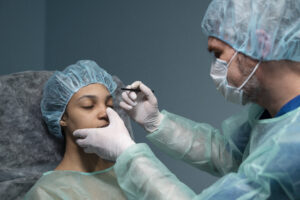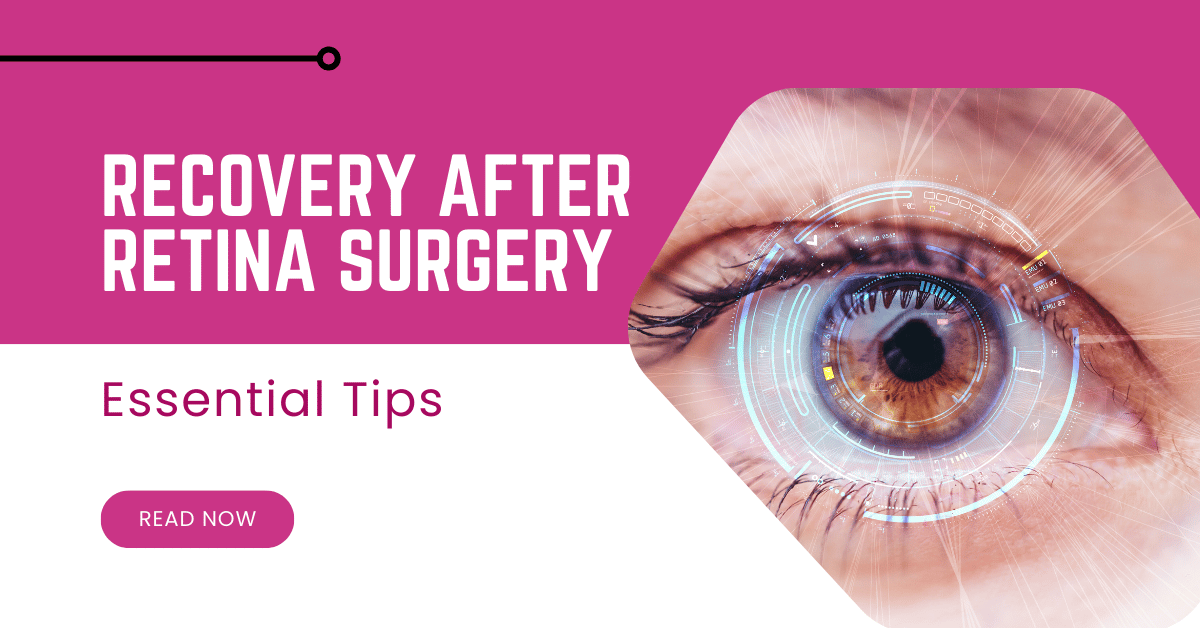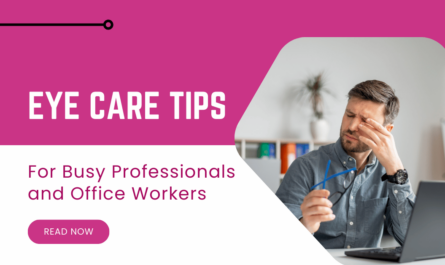Introduction
Retina surgery is a crucial procedure designed to address serious eye conditions such as retinal detachment, macular holes, or diabetic retinopathy. Given the retina’s vital role in vision, proper post-operative care is essential for a smooth recovery and optimal results. Patients who adhere to their doctor’s recommendations and take necessary precautions can significantly improve their chances of regaining clear vision. In this blog, we will cover essential tips for a successful recovery, common concerns, and expert recommendations to help patients navigate their healing journey effectively.
Understanding Retina Surgery
Retina surgery is a medical procedure aimed at repairing damage to the retina, the light-sensitive layer at the back of the eye that is essential for vision. Some common types of retina surgeries include:
- Vitrectomy: A procedure where the vitreous gel is removed to access and repair the retina.
- Scleral Buckling: A technique that involves placing a small band around the eye to support the retina.
- Laser Photocoagulation: A laser treatment used to seal retinal tears and prevent detachment.
- Pneumatic Retinopexy: A procedure where a gas bubble is injected into the eye to help the retina reattach.
Each of these procedures requires careful post-operative care to ensure proper healing and prevent complications.
Common Concerns After Retina Surgery
Patients often have concerns about their recovery and what to expect after surgery. Some of the most common concerns include:
1. Pain and Discomfort
Mild to moderate discomfort is normal after retina surgery. Patients may experience soreness, itching, or a foreign body sensation in the eye. Over-the-counter pain relievers or prescribed medications can help alleviate discomfort.
2. Blurry Vision
Blurry or hazy vision is expected post-surgery and can take weeks or even months to fully improve. Patience and adherence to post-operative guidelines are key to achieving the best outcome.
3. Light Sensitivity and Floaters
Increased light sensitivity and the presence of floaters (small dark spots in vision) are common. These symptoms generally decrease over time but should be monitored closely.
4. Posture Requirements
Certain retina surgeries, especially those involving gas bubbles, require patients to maintain a specific head position for an extended period to facilitate proper healing.
5. Infection Risks
Post-surgical infections are rare but can occur if proper hygiene and medication protocols are not followed. Redness, swelling, or pus-like discharge should be reported to a doctor immediately.
Best Practices for a Smooth Recovery
To ensure a successful recovery and protect vision, patients should follow these essential tips:
1. Follow Medication and Eye Care Instructions
Doctors often prescribe antibiotic and anti-inflammatory eye drops to prevent infection and reduce swelling. Follow the recommended schedule and dosage precisely.
2. Maintain Proper Head Positioning
For surgeries involving gas bubbles, positioning is crucial. Patients may be required to keep their heads facing downward or in a specific angle for a set period to aid retinal reattachment.
3. Avoid Strenuous Activities
Strenuous activities such as lifting heavy objects, bending over, or engaging in intense physical exertion should be avoided for several weeks to prevent complications.
4. Limit Screen Time and Reading
Extended screen time or excessive reading can strain the eyes. Patients should take frequent breaks and avoid activities that require prolonged focus.
5. Protect the Eye
Wearing an eye shield or protective glasses can prevent accidental bumps, dust, and infections. Patients should also avoid rubbing or pressing on the eye.
6. Maintain a Healthy Diet
A nutrient-rich diet can support eye health and promote faster healing. Foods high in antioxidants, omega-3 fatty acids, and vitamins A, C, and E are beneficial.
7. Attend Follow-Up Appointments
Regular check-ups with the ophthalmologist ensure that the retina is healing properly and allow for early detection of potential complications.

Doctor Introduction
Dr. Smita Mukherjee is a senior ophthalmologist with more than 30 years of experience. She completed her post-graduation from Seth G.S. Medical College with academic honors and later joined the faculty of the same college, where she gained extensive experience in all branches of ophthalmology.
As a recognized University Post Graduate teacher, Dr. Mukherjee has trained several batches of postgraduate students. Since 1997, she has been practicing privately and currently conducts consultations at Oculus Eye Clinic, Sanpada and Eye Solutions Clinic, Chembur for the past 22 years. She specializes in Cataract, Phacoemulsification, Refractive Errors, Diabetic Retinopathy, and Age-Related Macular Degeneration.
Consultation Address: Eye Solutions Clinic 401, Pearl Belleza, D.K. Sandu Marg, 19th Road Corner, Chembur, Mumbai 400071
FAQs
1. How long does it take to recover from retina surgery?
Recovery varies depending on the procedure, but most patients see improvements within a few weeks to a few months.
2. Can I watch TV after retina surgery?
Limited screen time is allowed, but patients should avoid excessive strain on their eyes in the initial weeks.
3. Is pain normal after retina surgery?
Mild discomfort is common, but severe pain should be reported to a doctor immediately.
4. When can I return to work after surgery?
Patients with desk jobs may return in a few weeks, but those with physically demanding jobs may need a longer recovery period.
5. What foods should I eat for better recovery?
Foods rich in omega-3s, vitamin C, and antioxidants, such as fish, leafy greens, and citrus fruits, can support eye health.
6. Can I drive after retina surgery?
Driving should be avoided until an ophthalmologist confirms that vision has improved sufficiently.
7. Will my vision fully recover?
The extent of vision recovery depends on the severity of the condition and how well post-surgical guidelines are followed.
Conclusion
Retina surgery is a life-changing procedure that requires careful post-operative care for optimal results. By following prescribed medications, maintaining the right head position, avoiding strenuous activities, and attending follow-up visits, patients can ensure a smooth recovery. Consulting an experienced ophthalmologist like Dr. Smita Mukherjee is crucial for the best possible outcome. If you or a loved one needs expert eye care, don’t hesitate to book an appointment at Eye Solutions Clinic, Chembur.
A successful recovery starts with proper guidance—take the right steps for your eye health today!



